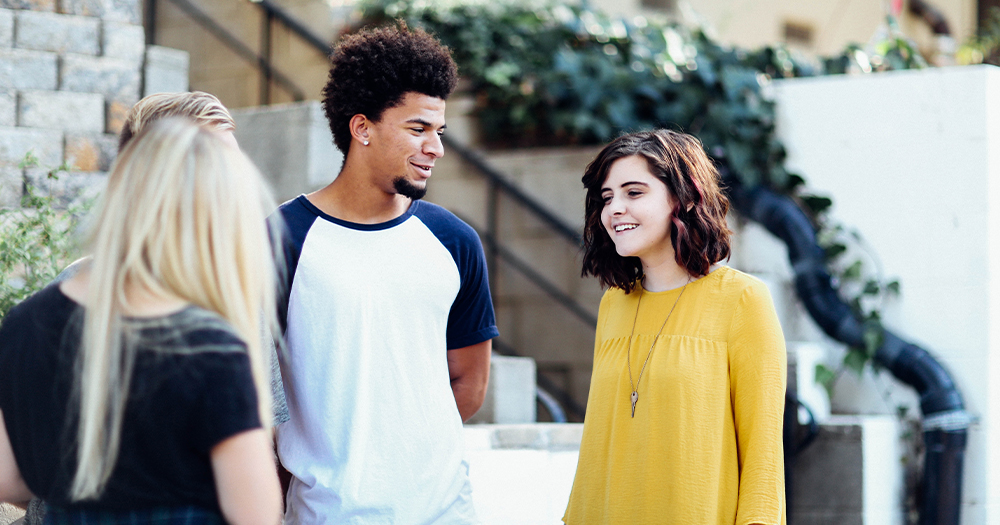Every Autumn, thousands of young people across Ireland embark on the next chapter of their lives: going to university. For many, this is a time of self-discovery and reinvention, where they can explore the depths of their character in dynamic, supportive surroundings. This is particularly true for young members of the LGBTQ+ community. While the experience is different for everyone, starting college life, for many young queers, coincides with another very important rite of passage: coming out.
This year, however, things are a little different. In lieu of lecture halls, society events and sprawling campuses, classes are held mostly online. Many LGBTQ+ people around the country may find themselves in a transient place, and don’t have the option of coming out in a safe and supportive environment such as college. With this in mind, I spoke to Rita Wild, from Gay Project in Cork, to discuss what it might mean to come out in quarantine, and how to signal our support and allyship to isolated members of the LGBTQ+ community.
The realisation that LGBTQ+ students may feel particularly isolated as they navigate online university hit Rita in August. She was approached by representatives from University College Cork to deliver a talk to first year students as part of their induction. As she prepared, she realised quite quickly that while online college was going to be challenging for everyone, it might be especially difficult for LGBTQ+ students deprived of the opportune moment to come out with the support network of like-minded peers and LGBTQ+ societies. Moreover, many young queer people may be in hostile living situations, where coming out is an unsafe thing to do.
This, Rita notes, is uncharted territory: “If you’re a young person who is thinking about your sexual orientation, thinking about coming out, or thinking about your gender identity – it can make you quite vulnerable.” There is no guidebook on how to come out during a global pandemic. For Rita, a number of questions immediately spring to mind. First of all, what does it mean to come out as queer in a quarantine? How safe is it? What kind of coming out experience is it? When we can’t get the feedback of our peers in the same room as us, how do we know who to trust? How can we find out who our allies are?
While we may not have all the answers just yet, one thing remains clear. Visible allyship is vital. Rita points to the key findings from the BeLonG To 2019 School Climate Survey as a launching pad. The study found that 73% of LGBTQ+ students felt unsafe at school. 86% of those surveyed felt deliberately excluded by their peers, and 77% were the victims of verbal harassment. While the study demonstrates the bleak reality faced by LGBTQ+ people in Irish schools, it also highlights the differences allyship can make.
The minority of LGBTQ+ students who felt safe in schools did so because they were supported by staff members and peers. Rita uses this fact as a starting point for addressing the needs of isolated members of the community: “What made the difference to the students who felt safe was having allies. Those allies were peers, teachers and family members. With younger queer people in mind, how do we flag allies to them? How do we indicate that the person they’re talking to is an ally?”
In response, Rita and her colleagues at the Gay Project teamed up with artist Konrad Im to design a postcard that might signal to isolated LGBTQ+ students that they are not alone. The postcard reads ‘Ally’, and when you zoom in on the ‘A’, you can see ‘LGBT+’. On the reverse, there are contact details for BeLonG To Youth Services. The aim is to get the postcards into the hands of lecturers, teachers and students so that they can signal their allyship to LGBT+ students during online classes.
With the understanding that not every queer has the privilege of coming out in a supportive environment such as college, Rita and Konrad wanted to ensure that the postcards were subtle in terms of design. “When you’re in a hostile environment, and you’re queer, it often feels like there’s a big neon sign on your head, and if anything ‘too gay’ comes into your field, it can make you feel really uncomfortable and unsafe,” Rita says. “It’s an anxiety. This is just what it feels like when we’re not fully out, and not in a safe environment. So the postcard is very subtle. It doesn’t scream ‘gay!’ at you, but it’s also just ‘gay enough’ to grab your attention.”

To get the postcards into the hands of university staff, Gay Project are liaising with the various LGBTQ+ societies in colleges across the country. From there, society representatives can reach out to faculty members and explain the goal of the campaign. “They will either have postcards sent to them, or they can download them and print them off in-house, and put their own information on the back,” Rita explains. “It’s really about making it as simple and accessible as possible.”
To amplify the message of solidarity, the Gay Project is also excited to release a powerful video campaign that will detail the importance of allyship. This project, in conjunction with the postcard launch, aims to make one thing very clear: LGBTQ+ people are not alone. Rita echoes this sentiment: “We see you. We know you’re there. And we’re waving at you. And that’s as much as we can do at the minute.”
Admittedly, there is no simple way to ease the pain of LGBTQ+ folk trapped in hostile environments. “This has never happened before,” Rita tells me. “We don’t know what coming out in global pandemic looks like. We have no answers, but we have lots of questions. The best we can hope to do is to recognise the problem and try and find solution.”
It is also important to note that the idea of ‘coming out’ will be different for every individual. There is no wrong or right way to do it. For many, coming out to family members simply isn’t an option. It can be an unsafe thing to do for LGBTQ+ people of any age. Moreover, ‘coming out’ is rarely a once-off. Many will find themselves having to ‘come out’ to numerous people throughout the course of their life.
Moninne Griffith, the CEO of BeLonG To, recently spoke about the power of coming out – as well as the huge challenges associated with it – to mark International Coming Out Day on October 11: “Coming out can allow individuals to live an open, authentic and fulfilling life as themselves, and reduces some of the stress and anxiety many people feel when they are hiding part of themselves, who they are or who they love. Many LGBTQ+ people say that coming out to family and friends feels like lifting a massive weight off their shoulders. Saying that, we always remind LGBTQ+ youth to consider whether they feel safe coming out and remember that they don’t need to tell anyone until they are ready. Coming out is a choice, not an obligation.”
© 2020 GCN (Gay Community News). All rights reserved.
Support GCN
GCN is a free, vital resource for Ireland’s LGBTQ+ community since 1988.
GCN is a trading name of National LGBT Federation CLG, a registered charity - Charity Number: 20034580.
GCN relies on the generous support of the community and allies to sustain the crucial work that we do. Producing GCN is costly, and, in an industry which has been hugely impacted by rising costs, we need your support to help sustain and grow this vital resource.
Supporting GCN for as little as €1.99 per month will help us continue our work as Ireland’s free, independent LGBTQ+ media.
